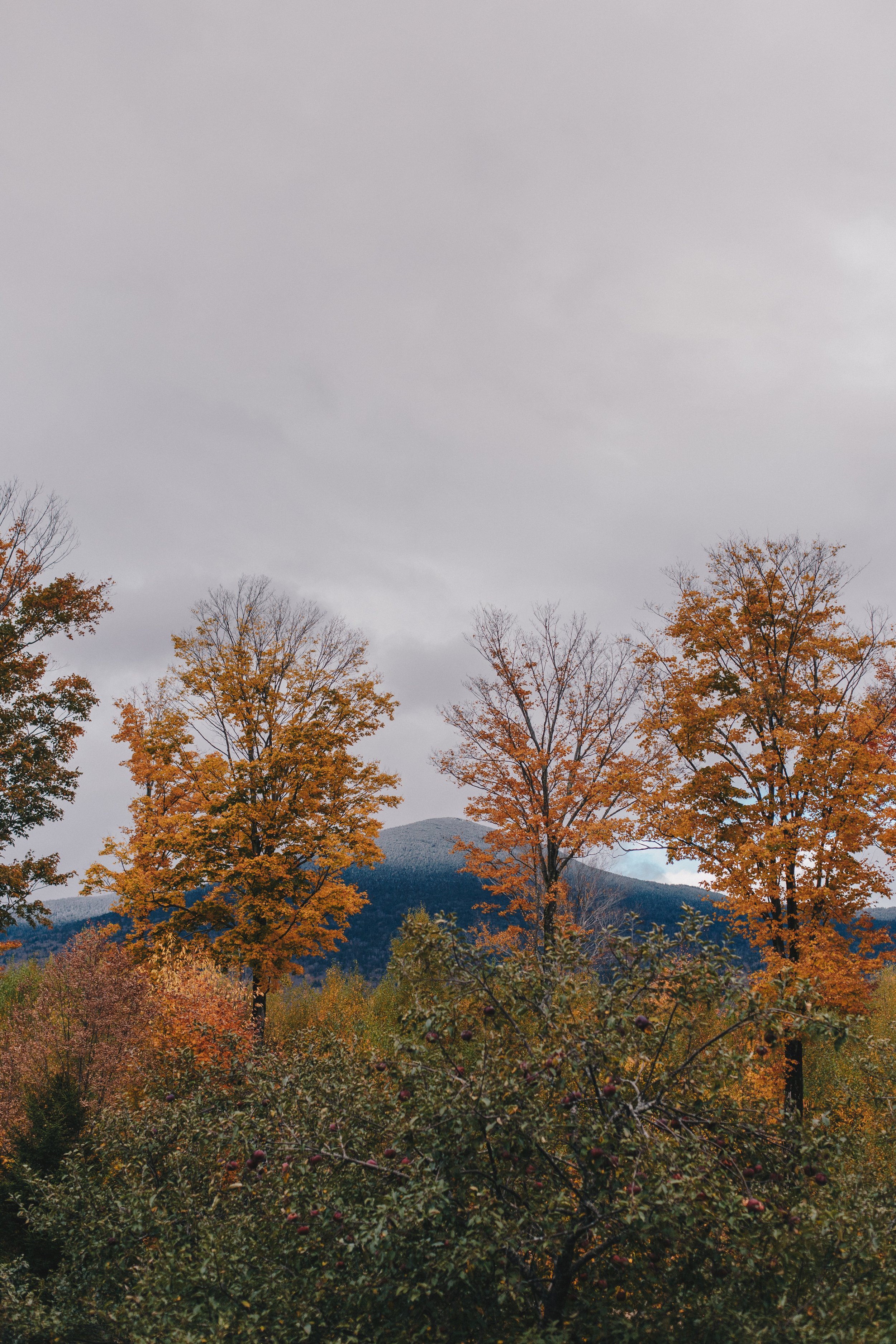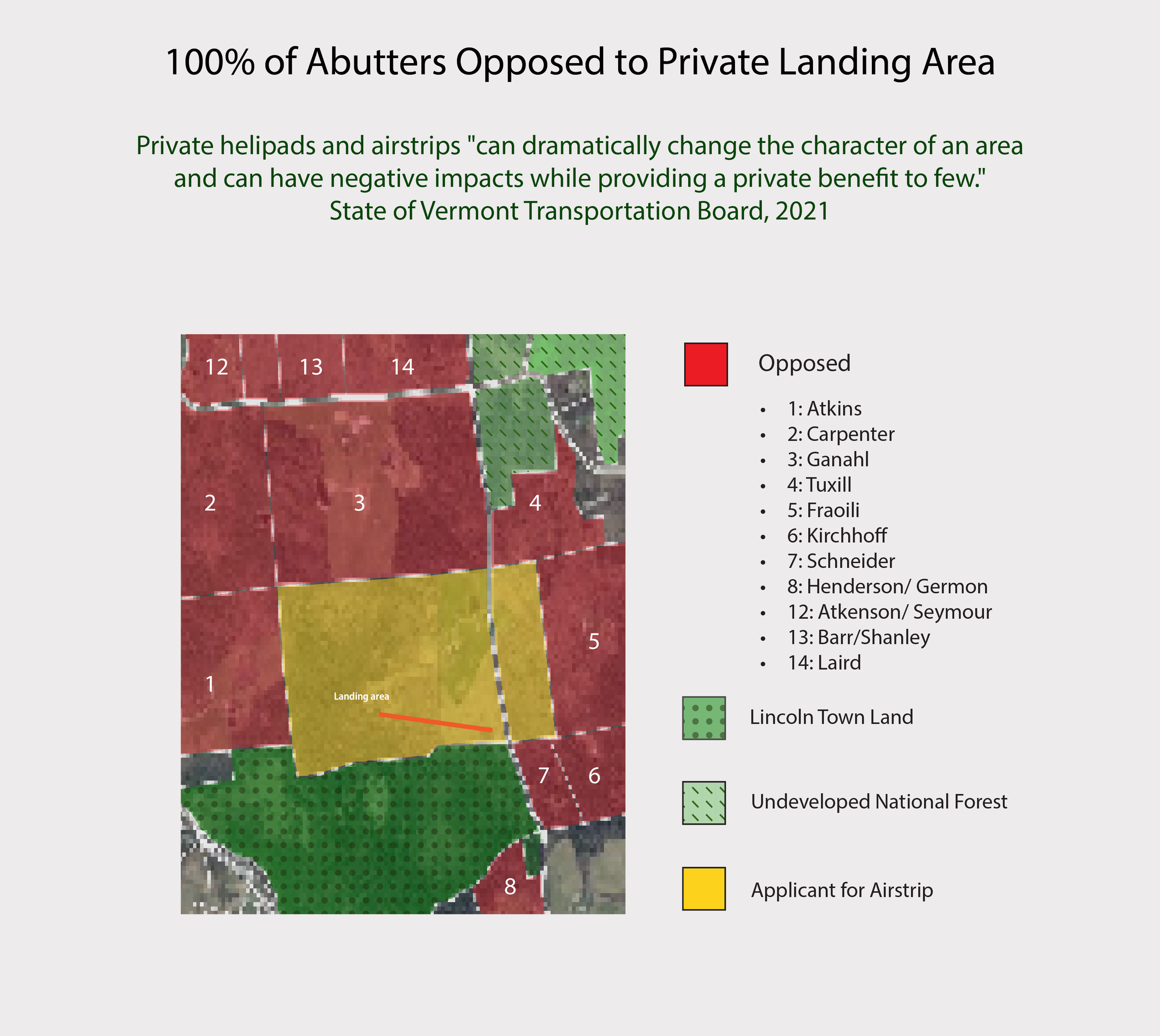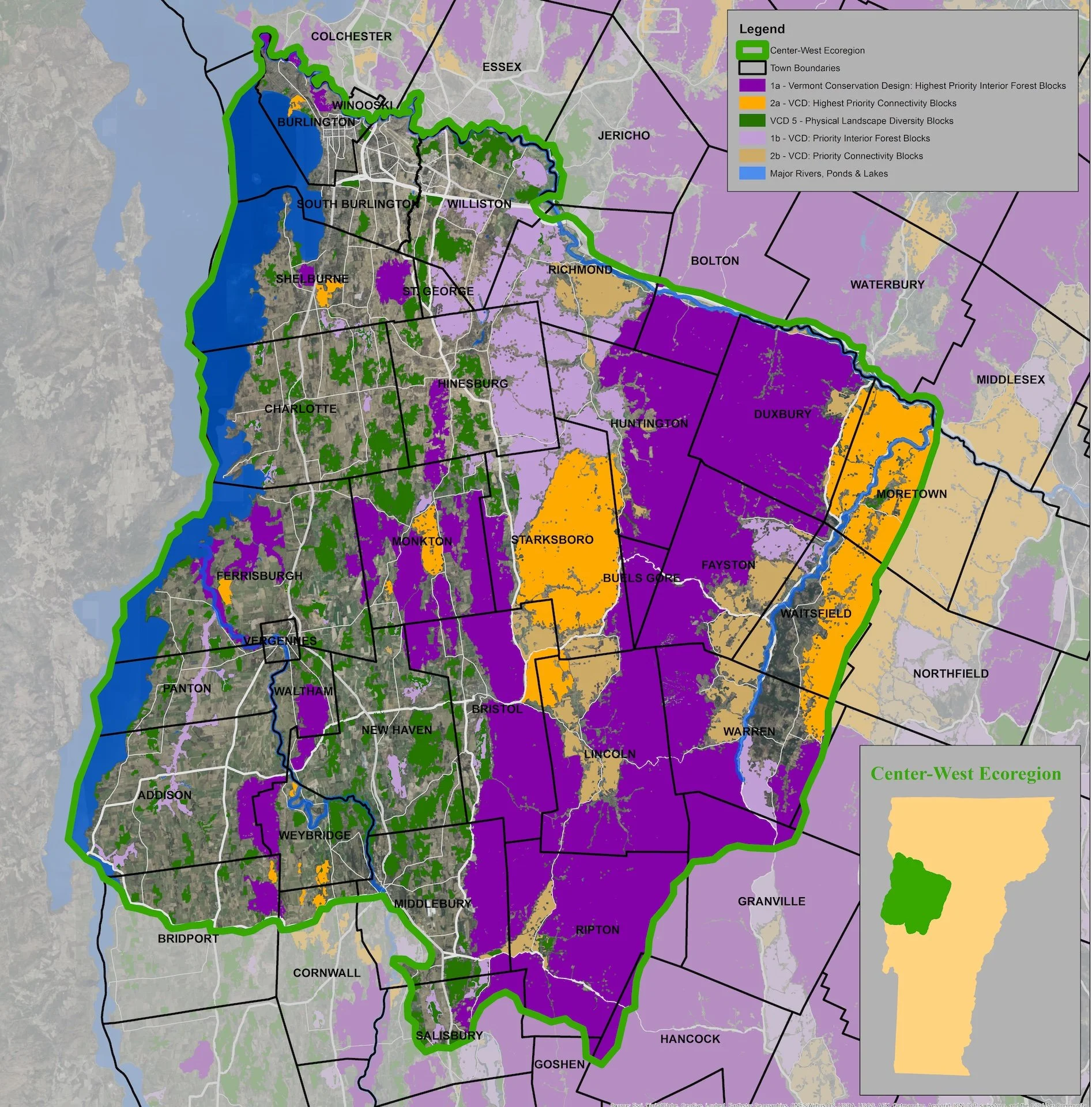
Cases from Vermont
Lincoln
The Lincoln experience with a private landing strip application
On March 22, 2022, the Zoning Administrator of Lincoln granted a permit to a resident of Lincoln to build a 1500’ by 60’ landing strip on his property in the middle of Lincoln, just east of the village. This was granted as an Accessory Use Permit.
Not a single neighbor had been notified of this application, including the abutters. An abutter, acting on behalf of like-minded neighbors, filed an appeal against this permit on March 28, 2022, within the 15 day window of opportunity to make such an appeal. If the appellant had not heard about the permit by chance 'through the grapevine’ before the 15 days passed, a private airstrip would have been installed in a quiet, mountain village, with large tracts of forest identified by the state as a "conservation priority" - without any public process.
The appeal triggered a series of public hearings before the Zoning Board of Adjustment (ZBA), with opposition from neighbors and others. The ZBA rescinded the permit and upheld the appeal. The permit was revoked in September of 2022.
The applicant appealed the ZBA decision to the State Environmental Court. Concurrently, the applicant re-applied for a private landing area – this time using a Conditional Use application. Once again, there were numerous public hearings before a new Design Review Board (DRB), with continued opposition to the project. Maps developed by neighbors showed 100% of abutters opposed, as well as a large portion of surrounding residents likely to be impacted by the project. The hearings were closed on March 1, 2023, and in April 2023 the Lincoln DRB voted to deny the Conditional Use application for a proposed personal landing area.
The Lincoln case demonstrates the contentious and divisive nature of private landing area permitting. The state has not provided clear guidance, there is no required public review or vote, and towns are allowed to consider projects only from a narrow land use perspective. The town did not hold meetings in which facts and information were presented to the public for consideration and discussion, which further clouded understanding of the issues. A better system is needed to address permit applications that impact so many residents and change the character of a town. Furthermore, the fact that local residents had to hire outside counsel, at great cost, and spend large amounts of their time fighting this matter, illustrates the dysfunction of the current private landing area permitting system.
Here are some articles covering the events in Lincoln:
Seven Days article “Town of Lincoln Denies Beta Founder's Private Airstrip Permit”
VT Digger article “Lincoln denies Beta Technologies founder Kyle Clark an airstrip at his home”
Seven Days article “WTF: Who’s Been Flying Aerial Stunts Over Southern Chittenden County?”
Addison Independent article “Proposed Lincoln airstrip sparks debate.
VT Digger article “Beta Technologies founder Kyle Clark faces questions about airplane acrobatics at hearing over home landing strip”
VT Digger article “Lincoln residents offer feedback on Beta Technologies founder Kyle Clark’s plans to build an airstrip at his house”
Letters sent to the Lincoln DRB in February 2023 by abutters, neighbors, and residents.
© Gold Wing Photography
“I ask myself this one question, “why would the DRB [of Lincoln] approve something they will have no control over once complete.” The applicant and his lawyers have repeatedly told the ZBA and the DRB that air operations (rules, regulations, violations) associated with this proposed airstrip are the direct responsibility of the State Department of Transportation, the FAA and other Federal transportation related departments. Think about that , what does “no control” mean. No matter what happens at the airstrip or who is involved, the town of Lincoln (and that means the people of Lincoln) have no say, no operational control, no jurisdiction, no ability to effect change or to even cite grounds to terminate the permit once approved. Think about it, no control but what about responsibility for and to the people of Lincoln.”
Michael O’Connor, Retired Lt. Col in the Marine Corps with 22 years of service, a Naval Flight Officer in the Marine Corps who has flown backseat in the F-4 Phantom as a Radar Intercept Officer (RIO) and as a Weapons and Sensors Officer (WSO) in the F-18D Hornet.
“A recent decision by the town of Lincoln to permit a “restricted landing area” for aircraft on a private residential property has drawn criticism from neighbors and other residents who believe the permit application should have undergone public review… It is our request that the town of Lincoln revoke approval of the permit until a public notification and meeting process has been undertaken, impacts on the community and the environment are studied, safety concerns addressed, and a town-wide vote is held on whether to allow private airstrips in our rural community”, wrote Marilyn Ganahl in an April 1, 2022 letter to the town explaining her appeal of the permit. Two dozen Lincoln residents also signed the letter. The appeal was successful and the permit was rescinded. Concerns expressed in the April 1, 2022 letter include:
noise pollution, invasion of privacy and light pollution.
impacts of aircraft on wildlife, pets and domestic animals.
environmental impacts of building and maintaining the airstrip.
a “wholly inadequate and confusing” permitting process.
lack of clarity around what types of aircraft would be permitted.
Proposed Lincoln airstrip sparks debate. Addison Independent, 2022
A map produced by abutters and neighbors demonstrating that 100% of abutters opposed a private landing areas.
“Evident in the Opposition to a Private Landing Area by Neighbors and Abutters map is the large amount of undeveloped forest and wildlife habitat in proximity to the proposed landing area. As numerous others have attested, most people make the long journeys to and from Lincoln by car because it is worth living in a place so peaceful and quiet, with beautiful landscapes and views, a vast expanse of forest, and healthy and diverse wildlife, plants, and ecological systems. Very few towns in Vermont have as rich a connection to the natural world, and many of those living here consider it a responsibility to steward and care for what makes this place unique, as well as resilient in the face of a rapidly changing and unpredictable climate. The Town Plan is eloquent on the subject of the natural world, landscapes, and viewsheds, and the need to protect quiet areas and dark night skies."
Letter to the DRB. Sarah Laird, Lincoln resident, February 2023
Center-West Ecoregion Air Commons
Source: Vermont Family Forests
Center-West Ecoregion Wildlife Commons
Source: Vermont Family Forests
“Lifelong Lincoln resident Stephanie Atkins, whose property abuts Clark’s [the private airstrip applicant in Lincoln], asked Clark whether he would be flying at about 500 feet over her property as he comes in for landings. He confirmed that he would.“So that directly affects us,” Atkins said. ‘We have a farm. We have animals."
Lincoln residents offer feedback on Beta Technologies founder Kyle Clark’s plans to build an airstrip at his house. VT Digger, 2022
“Once a permit for a private landing area and helipad are issued, towns have no say over frequency and hours of flights, or types of aircraft used. “Citing recent conflicts and complaints arising from the aircraft use that had been approved for another Lincoln resident, Commissioner Sally Taylor lamented that Lincoln has “no control at all” over the comings and goings of helicopters [in another part of town]. Someone had brought it up with the selectboard, Taylor said, but the selectboard said there was nothing it could do. “There’s nothing on the books,” Taylor said. “We can’t prevent it.”
Proposed Lincoln airstrip sparks debate. Addison Independent, 2022



